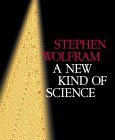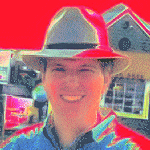Topics of Interest: A New Kind of Science

Wolfram, Stephen. A New Kind of Science. Wolfram Media, Inc. 2002.
Thursday night there was a reception of technology diehards at Quantam Books in Cambridge prior to Steve Wolfram's talk on a New Kind of Science at MIT. Quantum Books is considered the best technical bookstore on the planet by my former French colleagues who worked on object database technology with me in Cambridge so it was an appropriate venue for Wolfram. Later, he gave a compelling talk to a standing room only crowd in the main MIT lecture hall, Room 10-250. It ended with thunderous applause, although no standing ovation. An intriguing question and answer period followed.
Wolfram is a great promoter and has a software package to go along with his book, a web site, conferences and minicourses, an institute, a summer school, a whirlwind lecture tour, and a growing band of rebel scientists in universities promoting his approach. All of this while he stills remains a successful CEO at Mathematica.
I was in a somewhat altered state of consciousness from being midway through WWII veteran, Col. Philip Corso's book on the UFO crash at Roswell in 1947. Being a West Point grad who spent 15 years in the military, mostly as an Air Force fighter pilot, I had my own UFO experience and found Col. Corso's story credible. The most interesting idea he presented was that Bell Lab researchers were given an integrated chip recovered from the Roswell crash which they reengineered to product the first transistor. The latest microprocessors are probably more similar to that chip than the first primitive transistor created by mimicking silicon doped with arsenic, and I may be communicating to you via an alien technology!

Corso, Philip. The Day After Roswell. Pocket Books, 1998.
In any event, as Alan Kay, the inventor of Smalltalk, points out, interesting discoveries are found by investigating anomolous events that do not fit ordinary experience. This is how his team invented the mouse, the windows user interface, Smalltalk, the ethernet, the laser printer, and the first real workstation. Puzzling over alien technology is a good starting point for approaching Wolfram's work. In fact, he had just come from a talk to string-theory physicists who he said were not hostile to his point of view, but considered it alien.
Wolfram's book is a hefty piece of literature and I had him sign it at the Quantum reception. I'm studying it carefully a small piece at a time. It merits that level of attention. His basic argument is that cellular automata can exhibit complex behavior with a few simple rules. Adding more complexity to the rules doesn't necessary add more complexity to the behavior. For some cool examples of cellular automata, check out The Temple of Alife.
More interesting is his view of conventional mathematics which has been the primary tool for describing natural systems. Unfortunately, complex calculus and differential equations can only adequately describe simple phenomena. You quickly need to move to computer simulations to describe any complex behavior. One you move to computation, simple rules are more useful than calculus for generating complex behavior, such as the growth of a tree or rendering of a natural scene. This is obviously heresy to mathematicians. In a previous incarnation, I was assistant professor of mathematics at the U.S. Air Force Academy and I have some sympathy with Wolfram's position.
This is not heresy to computer scientists who are familiar with cellular automata. In fact, it can be shown that many simple automata are computational complete, i.e. they can generate any calculation that is possible on a computer. Thus the computer can simulate all of the results of calculus and in a sense, cellular automata can be shown to subsume calculus. Calculus is just not as useful in computer science as it is in physics. In fact, Wolfram demonstrated a simple system with few rules that was a universal computational machine.
Many of Wolfram's ideas are forshadowed by Edward Fredkin. A fellow fighter pilot, I first met Fredkin in 1988 when he provided seed money for one of my startups, Individual.com. His view is that the universe is driven by unique discrete events, and a few simple rules generate all the complexity. It is helpful to understand Fredkin's ideas when forming an opinion of Wolfram's work, so check out his Digital Philosophy site.




0 Comments:
Post a Comment
<< Home